
http://www.iaeme.com/IJM/index.asp 101 editor@iaeme.com
International Journal of Management (IJM)
Volume 8, Issue 5, Sep–Oct 2017, pp. 101–110, Article ID: IJM_08_05_011
Available online at
http://www.iaeme.com/ijm/issues.asp?JType=IJM&VType=8&IType=5
Journal Impact Factor (2016): 8.1920 (Calculated by GISI) www.jifactor.com
ISSN Print: 0976-6502 and ISSN Online: 0976-6510
© IAEME Publication
PSYCHOLOGICAL CONTRACT- A
CONCEPTUAL FRAMEWORK
Dr. A. Savarimuthu
Professor in HRM,
St. Joseph’s Institute of Management, St. Joseph’s College, Tiruchirappalli, India
A. Jerena Rachael
Scholar
St. Joseph’s Institute of Management, St. Joseph’s College Tiruchirappalli, India
ABSTRACT
In the recent business environment we experience immense changes affecting the
current working of organizations in terms of nature of jobs, downsizing and drastic
changes in the technology & market demands which have gone beyond the traditional
structure of organizations. This has an adverse effect on the relationship of its workers
and employees which becomes the reason for variations and misconceptualization of
perceptions within the organizations. Therefore, this influences the need for
psychological contracts.
Psychological contract is a newly arousing organizational term that interprets the
fulfillment and non-fulfillment of organizational relationships in terms of mutual
obligations, expectations and promises. This phenomenon being an established term in
different parts of the world has only now taken its troll in India.
Lately, we see and hear of numerous issues of tangled employer and employee
relationships across the country. Psychological contract has its tune to epitomize its
existence explicitly and implicitly. This article discusses on the major conceptual parts
of psychological contract which will include importance and significance of
psychological contract, difference between psychological and employment contracts,
types, causes and effects of breach and violation of the contract.
Key words: Breach, Employment contracts, Importance, Psychological Contract,
Significance, Violation.
Cite this Article: Dr. A. Savarimuthu and A. Jerena Rachael, Psychological Contract-
A Conceptual Framework. International Journal of Management, 8 (5), 2017, pp.
101–110. http://www.iaeme.com/IJM/issues.asp?JType=IJM&VType=8&IType=5

Dr. A. Savarimuthu and A. Jerena Rachael
http://www.iaeme.com/IJM/index.asp 102 editor@iaeme.com
1. INTRODUCTION
Psychological contract had its existence since 1960’s but the importance and proactive need
was felt only in late 1990’s due to economic downturn. The reason behind its necessity is a
very fundamental phenomenon that is being studied by researches. This article will provide an
outline of the meaning, nature and importance of psychological contract as well how the
psychological contract differentiates itself with the legal employment contract, causes and
effects of breach and violation of contract. Psychological contract is basically measured from
an employee perspective though Guest (1998) points out that it is largely in the `eye of the
beholder'. Perception of each party differs according to the individual’s belief and values and
they are destined to assume a particular course of action as per their terms of understanding
and interpretation. Therefore, employers have to know what employees expect from their
work and vice-versa and this is where reciprocity and mutuality of either of the parties comes
into existence.
The psychological contract offers a framework for monitoring employee attitudes and
priorities on those dimensions that can be shown to influence performance (Chartered
Institute of Personnel and Development (CIPD), 2010). The early approaches of Argyris
(1960), Levinson (1962) and Schein (1965;1978) towards conceptualizing the psychological
contract as a form of social exchange rested upon the need to understand the role of subjective
and indeterminate interactions between two parties: employer and employee. To this end, the
expectations of both parties and the level of mutuality and reciprocity needed to be considered
jointly in order to explain the sources of agreement and disparity (Cullinane & Dundon,2006).
2. NATURE OF PSYCHOLOGICAL CONTRACT
Psychological contracts are an individual’s beliefs regarding reciprocal obligations. Beliefs
become contractual when the individual believes that he or she owes the employer certain
contributions (e.g. hard work, loyalty, sacrifices) in return for certain inducements (e.g. high
pay, job security) (Rousseau, 1990).
Rousseau (1995) therefore argues that the nature of psychological contract is subjective to
perception which differs between individuals. Second, the psychological contract is dynamic,
which means it changes over time during the relationship between the employer and
employee. Third, the contract concerns mutual obligations, based on given promises, in which
both parties invest in their relationship with the expectation of a positive outcome for them.
(Anderson & Schalk, 1998).
Researchers have utilized the concept of the psychological contract in a variety of ways
(Roehling, 1997) but it is important to recognize that there are significant aspects of all
definitions of the psychological contract which include elements such as values, beliefs,
expectations and aspirations of both the employee and employer (Middlemiss, 2011).
Despite the fact that the psychological contract is unique and idiosyncratic in nature, there
are in general two kinds of psychological contract: transactional and relational contracts
(explained in brief under types of psychological contract). These contracts have been argued
to differ on four important dimensions with respect to the focus of the contract; tangibility,
scope, stability and time frame (Rousseau and McLean-Parks, 1993; McNeil, 1985; Anderson
& Schalk, 1998) to which two more dimensions were then added in the works of Sels,
Janssens & Brande (2004) exchange symmetry and contract level.

Psychological Contract- A Conceptual Framework
http://www.iaeme.com/IJM/index.asp 103 editor@iaeme.com
3. IMPORTANCE OF PSYCHOLOGICAL CONTRACT
Anderson and Schalk, (1998) make it evident through their interaction with the employees
that the psychological contract is an explanatory notion. It has an impressively high `face
validity' and everyone agrees that it exists as most employees are able to describe the content
of their contract.
When an individual perceives that contribution that he or she makes obligate the
organization to reciprocity (or vice versa), a psychological contract emerges. A belief that
reciprocity will occur can be a precursor to the development of a psychological contract
(Rousseau, 1989)
When intimates start counting what each brings to the relationships, there arouses a reason
to question the shape that relationship is in. Looking into the necessity of psychological
contract in organizations and institutions, it motivates workers to fulfill commitments made to
employers when workers are confident that employers will reciprocate and fulfill their end of
the bargain. Employers in turn have their own psychological contracts with workers,
depending upon their individual competence, trustworthiness and importance to the firm’s
mission (Rousseau, 2004). Some employees might feel that the organization is failing to meet
its obligations and view their expectations not being realized. This could affect employee's
overall loyalty and performance (Rousseau, 1995; Beardwell et al., 2004; Sarantinos, 2007)
for now is an era of employment relations than industrial relations (Guest, 1998).
Employees in general claimed that they felt less secure in their jobs compared to a few
years ago. The reasons they gave were primarily associated with the declining levels of
demand and the consequent reduction in production levels (Martin; Staines; & Plate, 1998).
Psychological contract is a belief that the main expectation of employees in return for their
input to the company was a level of employment stability both in terms of working
environment and job security (Sarantinos, 2007). What is important in determining the
continuation of the psychological contract is the extent to which the beliefs, values,
expectations and aspirations are perceived to be met or violated and the extent of trust that
exists within the relationship (Middlemiss, 2011).
4. DEFINITION
Despite the interest and wealth of literatures pertaining to the psychological contract, there
remains no one or accepted universal definition (Anderson and Schalk, 1998). Psychological
contract has been defined on the basis of unwritten reciprocal expectations, implicit contract,
perceptions and beliefs.
`A set of unwritten reciprocal expectations between an individual employee and the
organization' (Schein, 1978).
`An implicit contract between an individual and his organization which specifies what
each expect to give and receive from each other in their relationship' (Kotter, 1973).
`The perceptions of both parties to the employment relationship, organization and
individual, of the obligations implied in the relationship. Psychological contracting is the
process whereby these perceptions are arrived at' (Herriot and Pemberton, 1995).
Rousseau’s development in the field of psychological contract plays a well defined role,
the latest development made in 1995, in her book, defines psychological contract as,
“individual’s beliefs, shaped by the organization, regarding terms of an exchange agreement
between the individual and their organization”. Beliefs here are the promises, obligations and
expectations of the parties to the contract (Conway, 2005).
A clear explanation to the above terms;

Dr. A. Savarimuthu and A. Jerena Rachael
http://www.iaeme.com/IJM/index.asp 104 editor@iaeme.com
Belief Definition Examples
Promise
1.‘a commitment to do (or not to do) something’ (Rousseau and
Parks, 1993)
2. ‘an assurance that one will or will not undertake a certain
action, or behaviour’ (Concise Oxford Dictionary 1996)
“I will get the reward
because that was the
deal”
Obligation
1. ‘a feeling of inner compulsion from whatever source, to act
in a certain way towards another, or towards the community; in
a narrower sense a feeling arising from beliefs received,
prompting to service in return; less definite than duty, and not
involving, the ability to act in accordance with it’. (Drever,
Dictionary of psychology, 1958)
2. ‘the constraining power of a law, percept, duty, contract,
etc.’(Concise Oxford Dictionary,1996)
“I should get the
reward because I
worked hard”
Expectation
1. ‘expectations take many forms from beliefs in the probability
of future events to normative beliefs’.(Rousseau and Parks,
1993)
2. ‘the attitude of waiting attentively for something usually to a
certain extent, defined, however vaguely’(Drever, Dictionary of
psychology,1958)
3. ‘the act or instance of expecting of looking forward; the
probability of an event’(Concise Oxford Dictionary,1996).
“I am likely to get
the reward as that’s
happened
occasionally in the
past”
Source: (Understanding Psychological Contracts at Work: A Critical Evaluation of Theory and
Research, Conway & Briner, 2005)
5. TYPES OF PSYCHOLOGICAL CONTRACT
5.1. Transactional
Transactional contracts are short term contracts that last only until the agreed period of
contract. Under a transactional contract, an individual’s identity is said to be derived from
their unique skills and competencies, those on which the exchange relationship itself is based.
For transactional oriented employees, the organization is simply the place where individuals
do their work and invest little emotional attachment or commitment to the organization. It is
the place where they seek immediate rewards out of the employment situation, such as pay
and credentials (Millward & Hopkins, 1998). Miles and Snow (1980) cited in their study that
transactional contracts involve specific monetizable exchanges (e.g. pay for attendance)
between parties over a specific time period as in the case of temporary employment or
recruitment by ‘buy’-oriented firms (Rousseau, 1990).
Use of ‘transactional psychological contracts’ - where employees do not expect a long-
lasting ‘relational’ process with their organization based on loyalty and job security, but rather
perceive their employment as a transaction in which long hours are provided in exchange for
high contingent pay and training – seemed to capture the mood of the day concerning labour
market flexibility and economic restructuring of the employment relationship (Cullinane &
Dundon, 2006). They undertake certain characteristics such as highly competitive wage rates
and the absence of long-term commitments (Rousseau, 1990). Negotiation of transactional
contracts is likely to be explicit and require formal agreement by both the parties. (Conway &
Briner, 2005)

Psychological Contract- A Conceptual Framework
http://www.iaeme.com/IJM/index.asp 105 editor@iaeme.com
5.2. Relational/Traditional
Relational contracts are broader, more amorphous, open ended and subjectively understood by
the parties to the exchange. They are concerned with the exchange of personal, socio-
emotional, and value based, as well as economic resources (Conway & Briner, 2005) and they
exist over a period of time. Williamson (1979) in his research work has mentioned that
relationships and relational issues such as obligations play an increasingly important role in
economics and organizational behavior (Rousseau, 1990).
Guest (2004) articulates the view that workplaces have become increasingly fragmented
because of newer and more flexible forms of employment. At the same time, managers have
become increasingly intolerant of time-consuming and sluggish processes of negotiation
under conventional employment relations systems. Consequentially, promises and deals
which are made in good faith one day are quickly broken due to a range of market
imperatives. With the decline in collective bargaining and the rise in so-called individualist
values amongst the workforce, informal arrangements are becoming far more significant in
the workplace. As a result, the ‘traditional’ employment relations literature is argued to be out
of touch with the changing context of the world of work (Cullinane & Dundon, 2006).
Relational contract establishes and maintains a relationship involving both monetizable
and non- monetizable exchanges (e.g. hard work, loyalty and security) (Rousseau, 1990).
According to the works of Blau (1964), mentioned in Millward & Hopkins, (1998) a
transactional obligation is linked with economic exchange, while relational obligations are
linked with social exchange. Unlike economic exchange, social exchange “involves
unspecified obligations, the fulfillment of which depends on trust because it cannot be
enforced in the absence of a binding contract. Rousseau (1990) ;Rousseau and McLean Parks
(1993) in their works have argued that transactional and relational contracts are best regarded
as the extreme opposite of a single continuum underlying contractual arrangements. In other
words, the more relational the contract becomes the less transactional and vice versa (Conway
& Briner, 2005).
The traditional psychological contract is generally described as an offer of commitment by
the employee in return for the employer providing job security ‐ or in some cases the
legendary 'job for life'(Cullinane & Dundon, 2006).
Rousseau (1995) has made the distinction between transactional and relational types of
contracts as below-
Transactional
--------Focus---------
-------Inclusion-------
-------Time frame----
----Formalization----
--------Stability-------
---------Scope---------
------Tangibility------
Relational
Economic Economic, Emotional
Partial Whole person
Closed ended specific
Open ended, indefinite
Written Written, Unwritten
Static Dynamic
Narrow Pervasive
Public, Observable Subjective, understood
A Continuum of Contract Terms
Source: (Psychological Contracts in Organizations: Understanding written and unwritten Agreements,
Rousseau, 1995)
Focus concerns the aspects which are important for the person who works which are
solely economic, extrinsic aspects (money) involved, or other (social-emotional) needs. Time
frame refers to the length of the contract: a certain endpoint, or the length undetermined,
Stability concerns the nature of the agreed tasks; in transactional contracts this is stable and



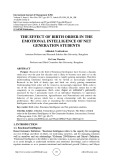
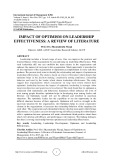



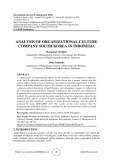
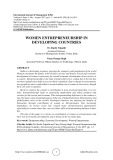
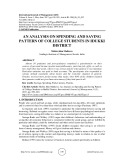






![Nội dung ôn tập Tâm lý học lứa tuổi học sinh trung học [chuẩn nhất]](https://cdn.tailieu.vn/images/document/thumbnail/2025/20251016/phuongnguyen2005/135x160/8151768537367.jpg)
![Đề cương học phần Tâm lý học nhân cách [chuẩn nhất]](https://cdn.tailieu.vn/images/document/thumbnail/2025/20251016/phuongnguyen2005/135x160/26911768537369.jpg)
![Đề cương ôn tập Tâm lý học đại cương [năm] chi tiết, chuẩn nhất](https://cdn.tailieu.vn/images/document/thumbnail/2025/20250115/sanhobien01/135x160/86881768473368.jpg)






